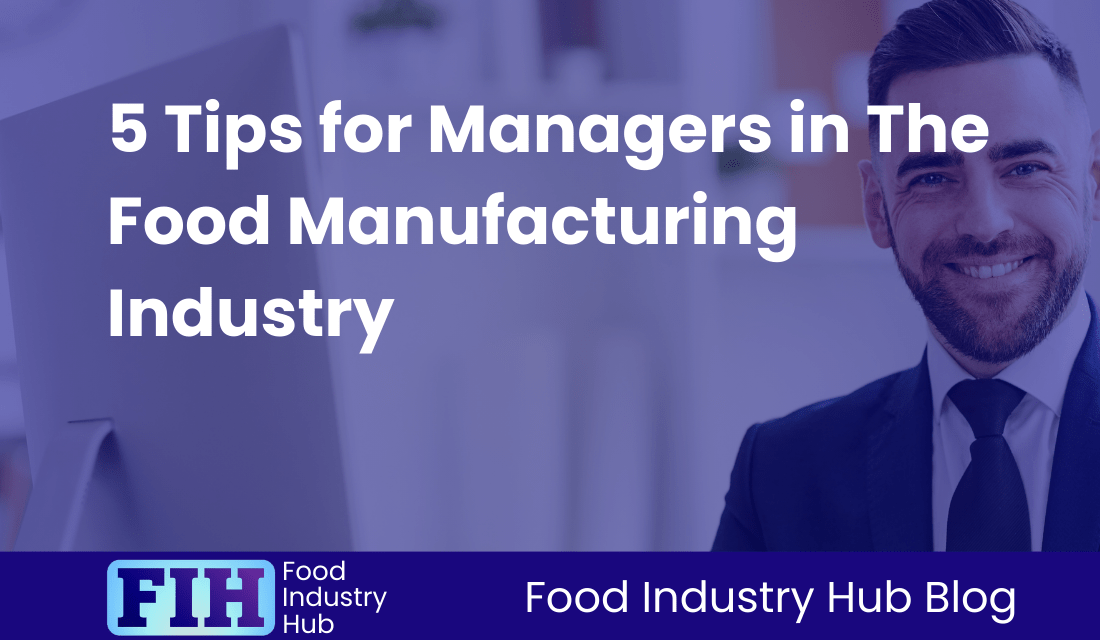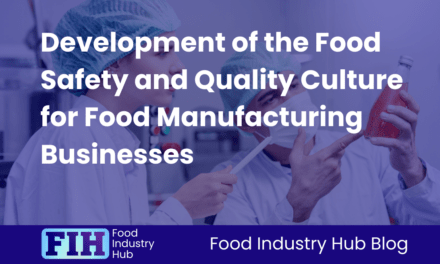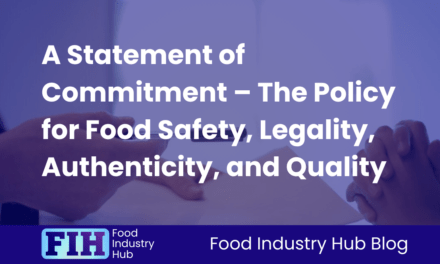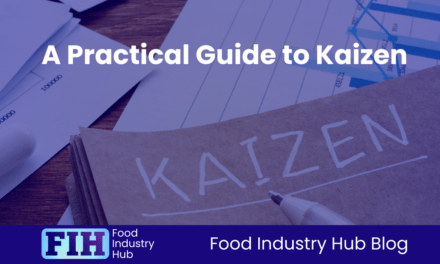Introduction
In this post, we will explore five tips to help bolster your managerial outlook.
From prioritising food safety practices to staying updated with industry regulations, these tips will not only help you maintain a smooth operation but also ensure the success and growth of your team and your business.
So, let’s dive in and discover how you can excel as a manager in food manufacturing.
Table of Contents
Key Takeaways
- Implement a robust food safety program and regularly inspect equipment, storage areas, and production processes to ensure compliance with regulations and guidelines.
- Streamline production processes by analysing current methods, eliminating bottlenecks, and investing in automation and technology.
- Foster effective communication within the team by encouraging active listening, creating a comfortable environment for expressing thoughts and ideas, and utilising communication tools and technologies.
- Develop a skilled workforce through targeted training programs, opportunities for career advancement and personal growth, and recognition of employees’ achievements and contributions.

Ensure your food manufacturing operations are audit-ready every day with Food Industry Hub Management Systems.
Prioritise Food Safety Practices
It can be easy for people in senior management positions – removed from the manufacturing process and focussed on commercial performance – to lose sight of this, but food safety and operational diligence is crucial to business viability. Placing unsafe food on the market erodes consumer trust, exposes the business to regulatory intervention (and recalls), and destroys brands.
It simply isn’t feasible to sustain a business which fails to produce safe, authentic, legally compliant food of the expected quality. As a manager, you always need to be focussed on the quality and safety of the product manufactured at your site because there is no room for error. Unsafe, inauthentic, poor quality food which fails to comply with regulatory demands is an existential threat to your business.
Implement and maintain a robust food safety program that includes regular inspections, employee training, and strict adherence to industry regulations.
Regular inspections are essential to identify any potential hazards or risks in your facility. Conduct thorough checks of all equipment, storage areas, and production processes to ensure that everything is clean and in proper working condition. Address any issues immediately to prevent contamination and ensure the safety of your products.
Employee training is a fundamental aspect of food safety. Make sure all employees are educated and trained on proper hygiene practices, handling of ingredients, and storage protocols. Regularly reinforce these practices through training and refresher sessions and provide clear guidelines for employees to follow.

Implement Efficient Production Processes
Ensure that your food manufacturing facility runs smoothly and efficiently by streamlining production processes. Efficient production processes are essential in the food manufacturing industry to maximise productivity, reduce costs, and meet customer demands. To achieve this, start by analysing your current production methods and identifying areas that can be improved.
Look for bottlenecks, unnecessary steps, or outdated equipment that may be slowing down your operations. Once identified, develop a plan to streamline these processes and eliminate any inefficiencies.
Investing in automation and technology can significantly improve production efficiency. Consider incorporating automated systems for tasks such as mixing, packaging, and labelling. These systems can increase output, reduce errors, and save time. Ensure that your equipment is properly maintained and regularly serviced to avoid breakdowns and delays.
Regularly reviewing standard operating procedures (SOPs) is another important step towards efficient production. SOPs provide clear instructions for each task, ensuring consistency and minimising errors. Train your staff on these procedures and emphasise the importance of adhering to them.
Regularly review your production processes to identify any areas that can be further optimised. Encourage your employees to provide feedback and suggestions for improvement. By continuously seeking ways to enhance efficiency, you can stay ahead of the competition and ensure the success of your food manufacturing facility.
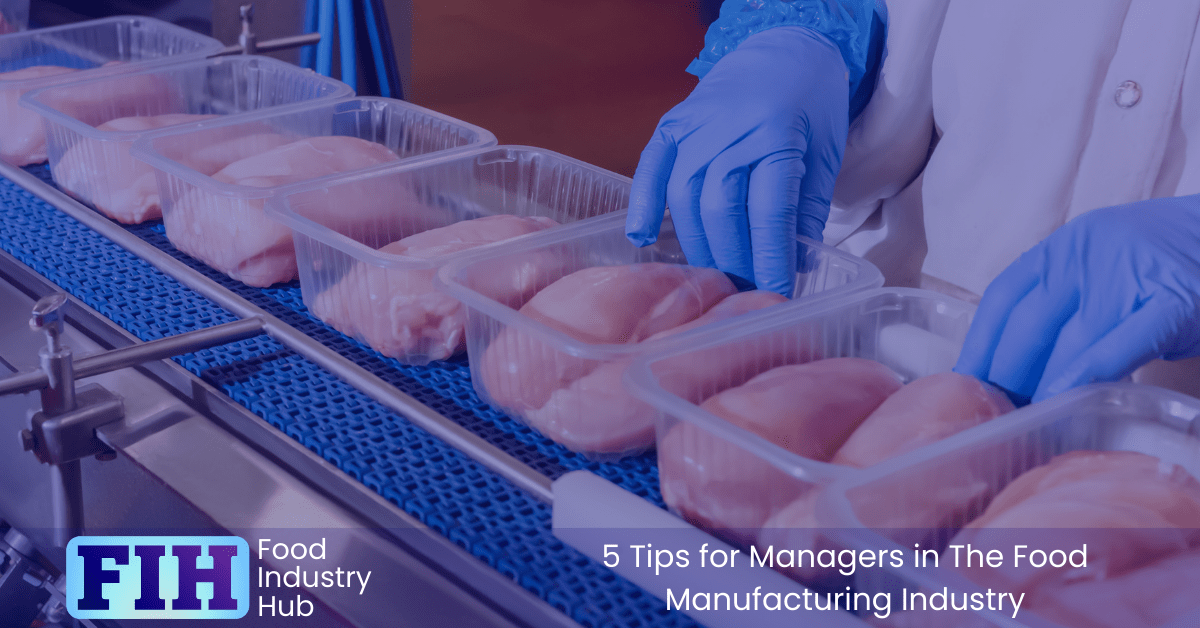
Sign-up for the Food Industry Hub Mail Service
We regularly produce new content for food industry professionals, and the Food Industry Hub Mail Service is the best way to stay up to date with the latest additions.
Signup today to be added to the Food Industry Hub mailing list.
Foster Effective Communication Within the Team
Promote seamless communication within your team to enhance collaboration and productivity. Effective communication is vital for the success of any team, especially in a fast-paced industry like food manufacturing. By building open and transparent communication channels, you can ensure that information flows freely between team members, departments, and the different levels of hierarchy.
To facilitate effective communication, encourage your team members to actively listen and express their thoughts and ideas. Create an environment where everyone feels comfortable speaking up and sharing their opinions. Encourage open dialogue and constructive feedback, as this will lead to better decision-making and problem-solving.
Use communication tools and technologies to streamline communication processes. Take advantage of digital platforms or software that allow team members to communicate and collaborate in real-time, regardless of their physical location. This will help overcome any barriers caused by distance or shift work.
Regularly schedule team meetings, both formal and informal, to provide opportunities for face-to-face communication. These meetings can be used to discuss goals, share updates, and address any concerns or issues. Encourage active participation and ensure that everyone has a chance to contribute and be heard.

Develop and Train a Skilled Workforce
Developing and training employees is fundamental to success in the food manufacturing industry. Having a team of skilled and knowledgeable employees is essential to meet the demands of customers and regulators, and stay ahead of the competition. By investing in the development and training of your staff, you not only improve the overall efficiency and productivity of your operation but also create a positive work environment that encourages employee growth and satisfaction.
To develop a skilled workforce, it’s important to identify the specific skills and knowledge required for each job role within your organisation. This will help you design targeted training programs that address the specific needs of your employees. By providing regular training sessions, workshops, and on-the-job coaching, you can enhance their existing skills and equip them with the latest industry trends and best practices.
Offering opportunities for career advancement and personal growth can help retain talented employees. Implementing a performance management system that provides regular feedback and recognition can also motivate employees to continuously improve their skills and performance.
Remember that developing and training a skilled workforce is an ongoing process. The food industry is constantly evolving, and your employees need to keep up with the latest technologies, regulations, and customer preferences. By investing in their development, you not only ensure the success of your business but also create a culture of continuous improvement and innovation.

Stay Updated With Industry Regulations and Standards
As a manager, it’s crucial for you to have a thorough understanding of the industry’s regulations and standards to ensure compliance and maintain a safe and efficient operation.
One way to stay updated is by regularly checking the websites of relevant regulatory agencies. These agencies often provide updates and guidelines to help businesses comply with the latest regulations.
Attending industry conferences and seminars can provide valuable insights into the changing landscape of food manufacturing regulations.
Another important aspect of staying updated is networking with industry professionals and joining industry associations. These connections can provide you with access to valuable resources, such as newsletters, webinars, and training programs that keep you informed about the latest regulations and standards.
It is also essential to establish a system for monitoring and implementing changes to regulations and standards within your organisation. This may involve conducting regular audits and inspections to ensure compliance and updating policies and procedures accordingly.
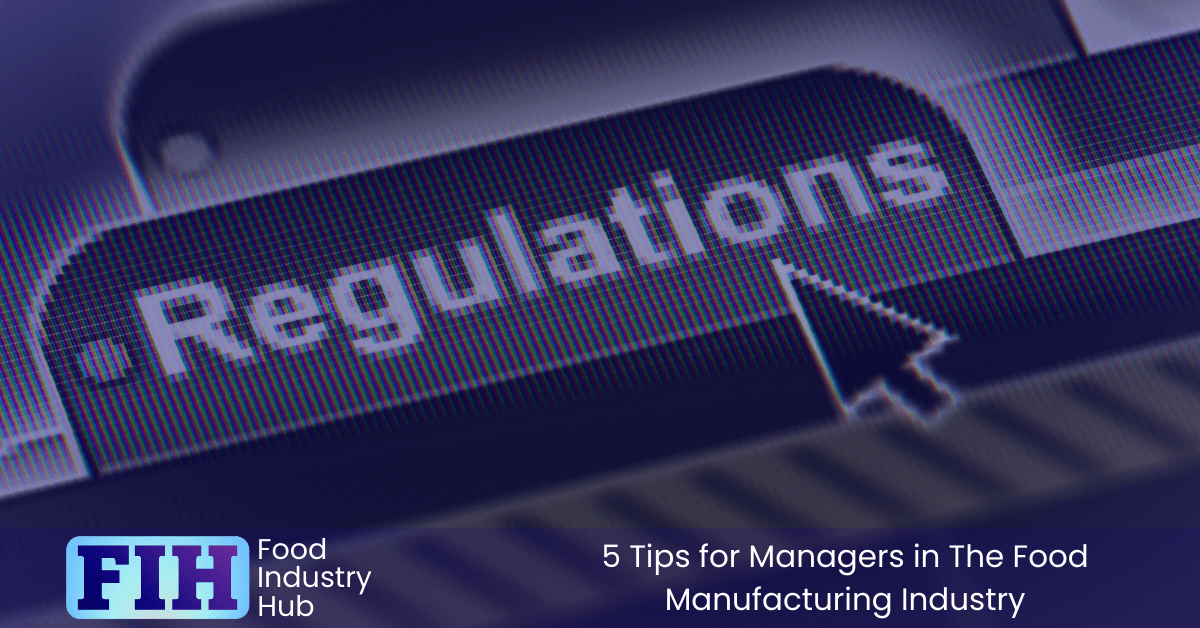
In Summary
As a manager in the food industry, you hold the power to ensure the safety and success of your team. By prioritising food safety, implementing efficient production processes, fostering effective communication, and developing a skilled workforce, you can create a harmonious rhythm within your organisation.
Stay updated with industry regulations and standards to stay ahead of the game and maintain a smooth flow in your operations.
With these tips, you can lead your team to thrive in the fast-paced world of food manufacturing.
Further Resources
Food Industry Hub serves the food industry with a range of digital resources for the benefit of both commercial food manufacturers and food industry professionals.
For food manufacturers, we offer integrated management systems that give every user a direct interface with your QMS.
For food industry professionals, we provide an extensive signposting service in addition to informational content we hope you’ll find useful as you face new professional challenges. We have very ambitious plans to expand the range of services offered, and currently present informational content on management, safety and quality, and professional success.

